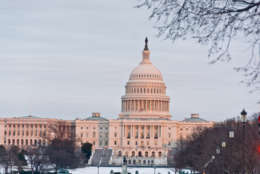federal pay raise
-
In today's Federal Newscast, the Trump administration says it now sees an opportunity to build on many of the 14 cross-agency priority goals outlined in the President's Management Agenda.
March 21, 2019 -
The Trump administration on Wednesday acknowledged that some federal employees are frustrated with how long it's taken to see the 1.9 percent retroactive pay raise.
March 20, 2019 -
The annual winter presentation of the president's budget is akin to other ancient rituals which have since lost their original purpose.
March 14, 2019 -
The Trump administration’s 2020 budget proposal for government spending gives a big boost to the Pentagon and other security-related agencies, while calling for a cut of more than $2.7 trillion in federal civilian spending over the next ten years.
March 12, 2019 -
In today's Federal Newscast, a group of nearly 40 senators are urging the appropriations committee to include back pay for federal contractors impacted by the last government shutdown, in an upcoming disaster relief package.
March 11, 2019 -
The retroactive-to-January increase is 1.9 percent, with 1.4 going to everybody eligible and the remaining 0.5 percent earmarked for locality pay.
March 07, 2019 -
In today's Federal Newscast, several DC area members of Congress want to know if it's realistic for federal employees to expect more money in their next paycheck on March 15.
March 06, 2019 -
Left in limbo are tens of thousands of workers at or near the top of GS-15. That cap covers GS-15 workers in steps 8, 9 and 10 in the Washington-Baltimore area and extends down to step 5 in San Francisco and San Jose.
March 04, 2019 -
In today's Federal Newscast, more than 17 years after Pentagon’s most expensive weapons acquisition first started, the Navy said its version of the F-35 is ready for combat.
March 01, 2019 -
For federal workers the good news is that Congress approved a 1.9 percent raise for them despite the fact that the president wanted to freeze pay in 2019.
February 28, 2019 -
A time frame has been issued for when feds can expect new locality pay tables from the Office of Personnel Management, 12 days after the president signed a 1.9 percent 2019 pay raise for civilian employees.
February 27, 2019 -
In today's Federal Newscast, the National Treasury Employees Union asked the Office of Personnel Management when federal employees can expect to see the 1.9 percent pay raise recently signed into law.
February 26, 2019 -
When it comes to salaries, not all men — or women — who work for Uncle Sam are created equal, or at least treated so. Some are more equal than others.
February 26, 2019 -
But if you don’t appreciate politicians trying to eliminate long-promised features of your Federal Employees Retirement System or Civil Service Retirement System packages fasten your seat belts.
February 25, 2019 -
Folks under the old Civil Service Retirement System, like people who get Social Security benefits, are protected from inflation. But most people on the federal pay roll are under FERS.
February 21, 2019















